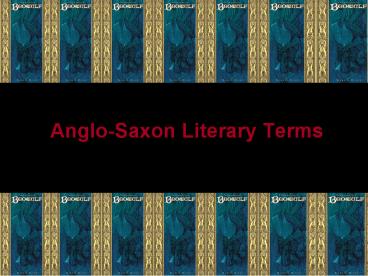Anglo-Saxon Literary Terms - PowerPoint PPT Presentation
1 / 17
Title:
Anglo-Saxon Literary Terms
Description:
Anglo-Saxon Literary Terms Epic ... sea in Old English could be called ... occurs in a number of different works over a period of time. Scop An Anglo-Saxon poet The ... – PowerPoint PPT presentation
Number of Views:195
Avg rating:3.0/5.0
Title: Anglo-Saxon Literary Terms
1
Anglo-Saxon Literary Terms
2
Epic
- A long narrative poem
- On a serious subject
- Written in a grand or elevated style
- Centered on a larger-than-life hero
3
Epic Conventions
- A concern with the fate of a nation or people
- A correspondingly large scale, often ranging
around the world - The intervention of supernatural figures
- Extended similes, generally called epic similes
- A simile is an explicit comparison of two
things, usually with the word "as" or "like." - Long catalogues, whether of ships, characters, or
places - Extensive battle scenes
- Begins in medias res
4
Caesura
- a pause somewhere in the middle of a verse. Some
lines have strong (easily recognizable) caesurae,
which usually coincide with punctuation in the
line, while others have weak ones.
5
Kenning
- a compound poetic phrase substituted for the
usual name of a person or thing. For example the
sea in Old English could be called segl-rad
'sail-road', swan-rad 'swan-road'. In line 10 of
the epic Beowulf the sea is called the hronrade
or 'whale-road'
6
Epic Boast- Flyting
- A proclamation of things a character has done or
will do in the epic
7
Archetype
- The word archetype is commonly used to describe
an original pattern or model from which all other
things of the same kind are made.
8
Comitatus
- The word archetype is commonly used to describe
an original pattern or model from which all other
things of the same kind are made.
9
Oral Tradition
- A process by which songs, ballads, folklore, and
other material are transmitted by word of mouth.
The tradition of oral transmission predates the
written record systems of literate society.
10
Fate
- The word archetype is commonly used to describe
an original pattern or model from which all other
things of the same kind are made.
11
Thane
- The word archetype is commonly used to describe
an original pattern or model from which all other
things of the same kind are made.
12
Mead
- A fermented beverage made of water and honey,
malt, and yeast
13
Pagan
- Paganism is a catch-all term which has come to
bundle together (by extension from its original
classical meaning of a non-Christian religion) a
very broad set of not necessarily compatible
religious beliefs and practices that are usually,
but not necessarily, characterized by polytheism
14
Alliteration
- Alliteration occurs when the initial sounds of a
word, beginning either with a consonant or a
vowel, are repeated in close succession.The
function of alliteration, like rhyme, might be to
accentuate the beauty of language in a given
context, or to unite words or concepts through a
kind of repetition.
15
Epithet
- A word or phrase, often but not always
disparaging or abusive, that expresses a
character trait of someone or something.
16
Motif
- A theme, character type, image, metaphor, or
other verbal element that recurs throughout a
single work of literature or occurs in a number
of different works over a period of time.
17
Scop
- An Anglo-Saxon poet The scop fulfilled many
roles in an Anglo Saxon tribe. Among those
functions were - court singer
- tribal historian
- genealogist
- teacher
- composer
- critic
- warrior
- traveler and reporter































